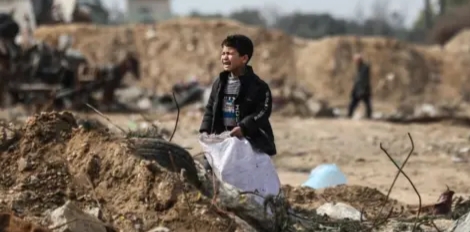
A Palestinian boy in Maghazi in central Gaza
100 killed in Gaza as Trump proposes ‘freedom zone’ to end Middle East tour
As US President Donald Trump toured Saudi Arabia, Qatar and the United Arab Emirates, promoting defence and economic deals and expanding attempts to normalise relations between Arab states and Israel, his comments on Gaza provoked anger and deep frustration among Palestinians living under an Israeli siege and attacks.
Despite the war-torn coastal enclave’s ongoing suffering under intense bombardment and blockade, Trump’s agenda focused almost exclusively on defence contracts, economic deals, and promoting regional normalisation with Israel.
The silence over Gaza’s catastrophe in these high-level meetings deepened the sense of abandonment felt by Palestinians in Gaza, who see their suffering treated as a footnote or, worse, an inconvenient obstacle to geopolitical interests.
Speaking from Doha, Trump reported to AFP that “envisions Gaza as a zone of freedom,” saying, “I would be proud if the United States owned it and made it a zone of freedom.”
To many Palestinians, Trump’s statements felt like a dismissal of their suffering, reducing their decades-long struggle to an economic opportunity.
The New Arab attemoted to get comments from Hamas regarding Trump’s regional tour and statement, but none of them responded at the time of publication.
However, a source close to Hamas told TNA that “Trump’s rhetoric proves again that Palestinian suffering is not a priority for American leaders.”
The source said that even Hamas’s recent release of Israeli-American soldier Edan Alexander as a “goodwill gesture” was ignored by Trump.
“This shows that US policies are not shaped by reality or humanitarian values, but by a one-sided vision that promotes domination,” the source added, noting that Hamas feels increasingly sidelined in a new regional order.
“Trump’s message is clear: the new Middle East is being built without us. And the silence from Arab states only adds insult to injury,” the source concluded.
“His statements shocked me,” Abeer al-Ra’i, a mother of seven displaced from Gaza City’s Shujaiya neighbourhood, now living in a tent in Deir al-Balah city, told The New Arab. “He talks about tigers, planes, and the economy, while our children are dying under the rubble. He didn’t mention the martyrs, the massacres, or the hunger we endure.”
“Trump imagines Gaza as an empty lot up for sale. But Gaza is not just land; it’s home to more than two million people. We are not an investment project but human beings who deserve dignity and justice,” al-Ra’i further said.
“Does he think he can simply take Gaza and turn it into a commercial zone? Is this supposed to be a solution, or just a new kind of occupation wearing a different mask?” she added.
Mahmoud Shabat, a merchant displaced from Beit Hanoun in northern Gaza, believes Trump’s comments reflect a larger pattern of “systematic ignorance” by US leadership.
“When Trump talks about expanding the Abraham Accords without mentioning Palestine, he’s effectively giving Israel a green light to continue its aggression,” Shabat said. “It’s not just a provocation. It legitimises the ongoing war against us.”
According to Shabat, turning Gaza into a so-called “freedom zone” would only obscure the actual demands of Palestinians.
“People here want safety, the right of return, and an end to the siege. We don’t want foreign-imposed solutions disguised with glittering slogans,” he said.
Khader Abu Hasira, a journalist based in Gaza City, noted how Trump’s language raised alarm bells among many Palestinians in Gaza.
“Terms like ‘freedom zone’ remind us of old proposals to displace or internationalise Gaza. It sounds like a new way of erasing us from the map,” he remarked to TNA.
“It reinforces the feeling that Gaza has become a bargaining chip and is no longer seen as part of a national liberation project but as a geopolitical card to play,” he added.
Abu Hasira further stressed that Trump’s comments felt particularly painful given the current humanitarian catastrophe, saying, “No one is calling for a ceasefire. No one is talking about real aid or reconstruction. Trump’s words focused only on what America and Israel want, not what the people of Gaza need.”
Political analyst Tariq al-Hajj argued that Trump’s statements reflect an ongoing effort to “liquidate the Palestinian cause through economic normalisation while ignoring basic rights.”
“There’s no talk about stopping the war, achieving justice, or protecting civilians. The focus is on deals, not dignity,” he told TNA. “Gaza is being reduced to a pressure card. It’s deeply painful that Palestinian blood no longer earns a single mention in regional speeches.”
Al-Hajj believes that the only way forward is for the various Palestinian factions to unite. “Fatah and Hamas must agree on a national project that protects what remains of Gaza and shields the Palestinian cause from being erased,” he said. “Internal divisions only serve those who want to eliminate us.”
“He draws strength from an Arab world that has failed to hold him accountable, despite all the ties and interests it shares with Washington,” the analyst stressed.
While leaders debate and foreign powers offer top-down visions, the people of Gaza are left with basic, urgent demands: a halt to the bombings, access to aid, the reopening of crossings, and genuine reconstruction.
